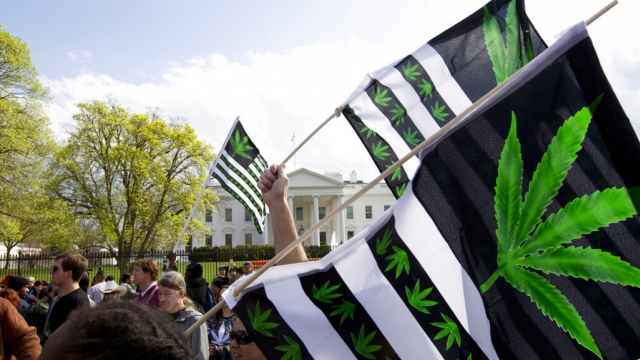Chris Goldstein was convicted on felony marijuana possession charges in Philadelphia after smoking a joint in a federal park while protesting for weed decriminalization in 2013.
"I went out to protest to end federal prohibition and I ended up with a federal marijuana record," Goldstein said.
While smoking marijuana has been decriminalized in most states, for Goldstein, and thousands of others with federal charges for simple marijuana possession, their criminal records have been a burden on their lives.
"This is something that shows up on every criminal background check, whether it's for an apartment or a sports team, or a job. And the strange thing about it is, they're not going to see, like in my case, they won't see that it's for a half gram of marijuana. They'll just basically see that I have a federal drug conviction," Goldstein said.
SEE MORE: On 4/20, a look at America's marijuana landscape
But last October, President Biden made an announcement to lift that weight, issuing a sweeping pardon for the over 6,500 Americans charged for felony marijuana possession.
"No one should be in jail just for using or possessing marijuana," the president said in a video unveiling his executive order.
The pardons were supposed to take effect immediately, but now, six months later, Goldstein says he has no record that his crimes were forgiven.
"One of the problems with pardons — even when granted automatically — is proving to somebody that's reviewing your record that you have been pardoned for a specific conviction. And without a certificate, there's really no way to do that," said Morgan Fox, political director for the National Organization for the Reform of Marijuana Laws (NORML).
It was only last month that the Justice Department published an online application for a certificate of pardon.
The Justice Department did not respond to a Scripps News request to know how many people have applied for or been granted a certificate.
SEE MORE: Biden pardons thousands convicted of 'simple' marijuana possession
Criminal justice reform advocates say it should be the government's responsibility to issue the certificates automatically, or at least notify people who are eligible.
Advocates also worry that the process, which requires specific case documentation, may be too cumbersome for some people.
"You might not have access to a computer or to the resources you need to an attorney; English might not be your first language; and, of course, you might not know you're eligible. This is a huge part of the problem," said Sarah Gersten, executive director of the Last Prisoner Project.
Goldstein says he's still waiting for his certificate. But that's just the first step for him.
"I'll have to literally, quite literally, walk around with the pardon certificate in my pocket in situations where I think I'll need it," he said.
Having the certificate explains the felony charge on a person's record, but it doesn't wipe it away. Advocates say expungement needs to be the next step, but that will require action from Congress.



